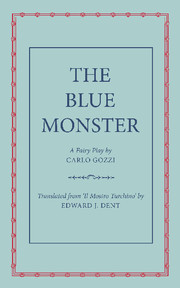Book contents
Carlo Gozzi and his Fairy Plays
Published online by Cambridge University Press: 05 June 2016
Summary
ITALIAN drama is a subject unfamiliar to English playgoers, even to those who have some acquaintance with the classical drama of France and Spain; the only name they are likely to know is that of Carlo Goldoni (1707—93), a few of whose sixty comedies have occasionally been acted in this country. Count Carlo Gozzi (1720–1806), Goldoni's contemporary in Venice and his embittered rival, is little known even to Italians at the present day unless they are serious researchers into theatrical history. Both of these two dramatists were described by Vernon Lee as far back as 1881 in her Studies of the Eighteenth Century in Italy (second edition, 1907), a book which can still be read with delight for its wonderful charm and imaginative insight; but modern research has shown it to be not altogether reliable on factual details. No play by Gozzi was ever acted in English until the Young Vic produced The King Stag in the autumn of 1948; but the English version used was made from a free French adaptation, and the present version of The Blue Monster is the first which has been made direct from the Italian.
The conflict between Gozzi and Goldoni arose from their fundamentally different attitudes towards the theatre, and more especially towards the Commedia dell'Arte, generally called in English the Comedy of Masks. Goldoni made it his life-work to destroy it; Gozzi adored it and was the last Italian playwright who succeeded in keeping it alive. The Comedy of Masks, which dominated the Italian theatre for some three and a half centuries and at a quite early date spread from Italy to Germany, France, Spain and England, survives still on our own stage, though in forms far removed from the original—the harlequinade of our christmas pantomime and the sophisticated affectations of certain modern ballets. Current criticism often talks vaguely about it, but most writers seem to have derived their knowledge from French sources instead of Italian ones.
The mediaeval drama in Italy as in other countries was acted by amateurs. It had begun with liturgical plays acted by clergy in churches; the first recorded in Italy took place at Padua in 1244, a Resurrection play, probably in Latin, although it was acted out of doors.
- Type
- Chapter
- Information
- The Blue Monster (Il Mostro Turchino)A Fairy Play in Five Acts, pp. v - xxiiPublisher: Cambridge University PressPrint publication year: 2013



